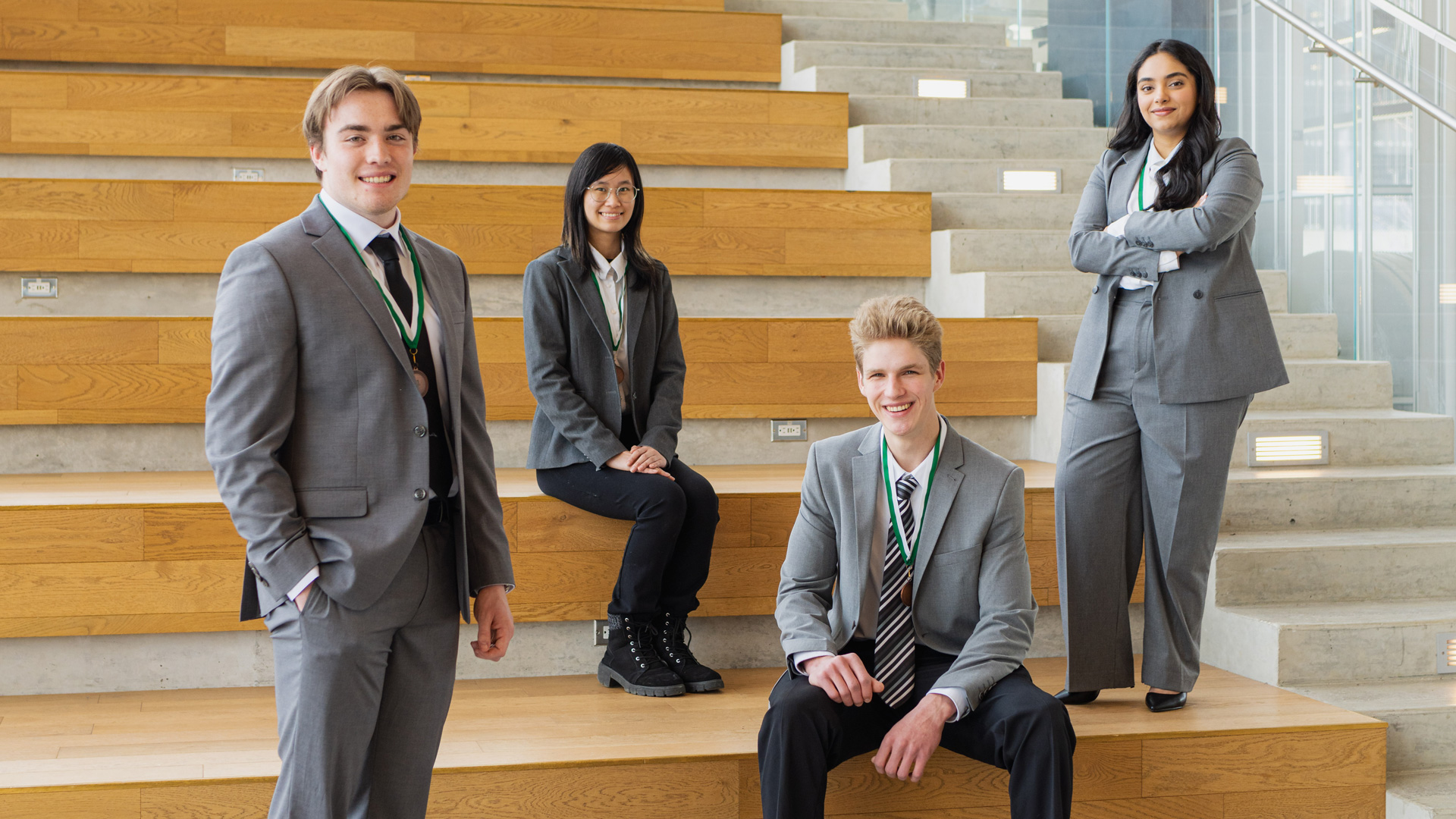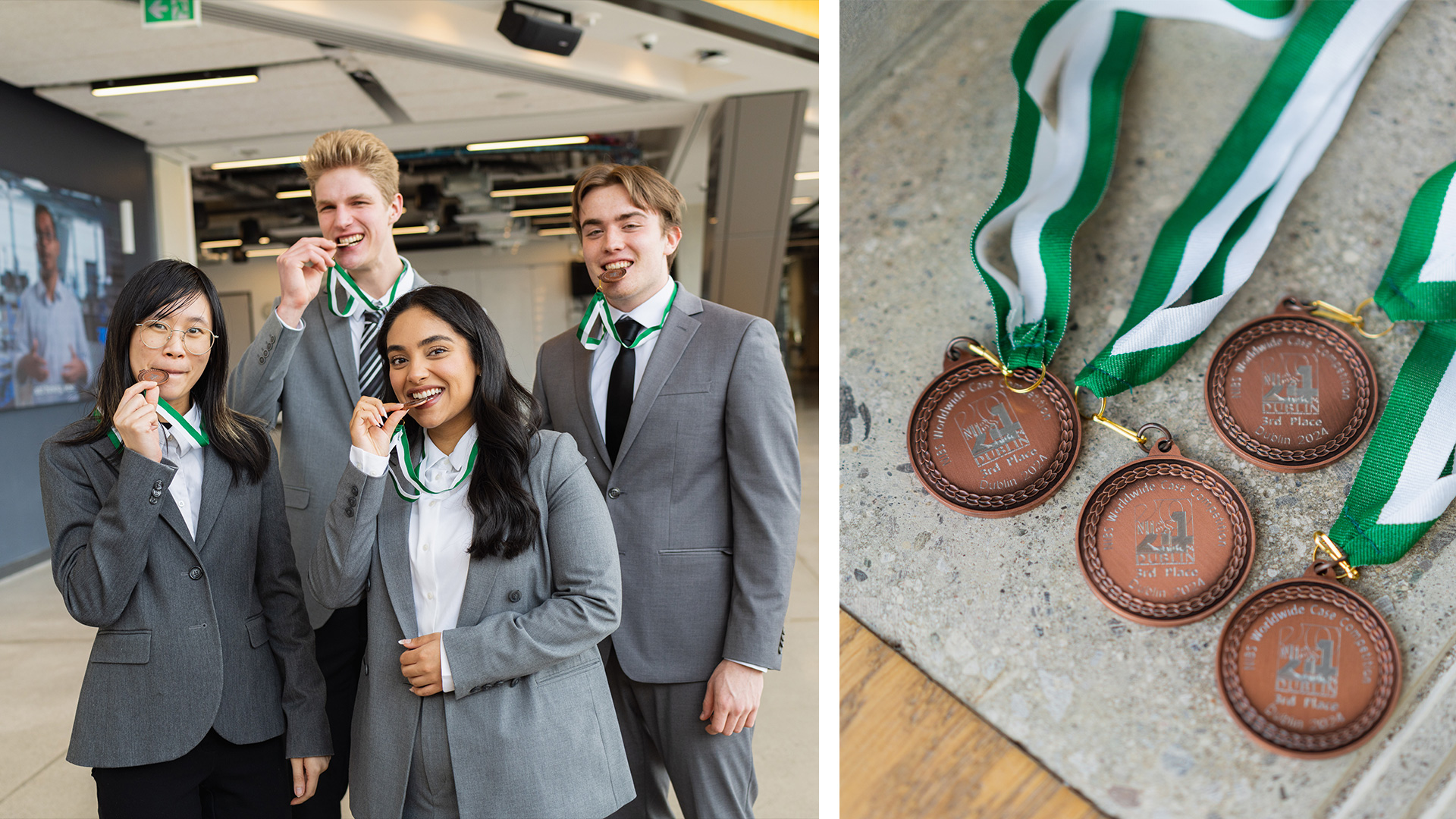Showing Adversity Who’s Boss: Guelph-Humber Students Bring Home the Bronze from International Case Competition
The 2024 edition of the Business case competition team continued the GH tradition of success in Ireland

When University of Guelph-Humber Business students, Kyle McKenzie, Kamaldeep (Kam) Mundi, Evan Thomas and Lyna Tran got off the plane in Dublin, Ireland, they were ready to compete. But beyond the weighty topics and intense pressure, they learned the University’s successful past at the NIBS Worldwide Case Competition was known all too well – so much so that rival teams were stopping Guelph-Humber’s participants in the hallways, eager to glean insights into their winning preparation strategies.
“That added a lot of pressure. We didn’t want to be the worst team to do this. We have nearly a decade of Guelph-Humber going to these competitions and doing well,” McKenzie said.
Hailey Zysman, Business instructor at Guelph-Humber, coaches the case study teams and knows the history of winning well as she was a member of the first-ever Guelph-Humber team.
“When Guelph-Humber goes to a case competition we often place in the top three,” Zysman explained.
The group upheld Guelph-Humber’s reputation and are fresh off winning a bronze medal at NIBS, placing ahead of 14 other teams from around the world. What’s truly remarkable? This was the first case competition they had competed at together.
Business case competitions see students from different universities solve business cases for companies. As part of the competition, they present their solutions to a panel of professionals, who judge their solutions.
For Tran, a fourth-year accounting student, it was sharpening her public speaking skills that was the driving force behind wanting to be on the team.
“A large part of why I wanted to be on the case competition team was to develop my public speaking skills, problem solving skills as well as meeting other people who are passionate about business,” Tran said.
McKenzie and Mundi wanted to be on the team to apply what they learned in class, and for Thomas who is focused on business marketing, it was to add to his credentials.
“It’s not enough to graduate with just a degree anymore. That’s not the standard for anyone. I figured if I wanted a better shot at networking and some real life experience this was a good thing to do.”
Real life experience is exactly what they got in the form of some adversity to start out the competition. Despite being jet-lagged from travel, one member with a fever and the other with a near-broken ankle - the team hunkered down and figured out a gameplan for the competition.
They all agree that having three hours to figure out a business case on the topic of hydrogen fuel cells without being able to access the internet for the semi-finals was amongst their toughest challenges.

“We had a game plan beforehand - within an hour, read the case [and] by the last hour have the strategy completed, but it took us more than an hour and half to go through the case because it was so difficult,” Mundi, also a fourth-year accounting student, explained, noting they adjusted their game plan on the fly.
That pressure became a motivator, and the team gave themselves pep talks, Muni explained.
“If we try our best there is no way that we couldn’t do well,” Mundi said.
While winning certainly tastes sweet, it isn’t the only tradition at Guelph-Humber – since day one, alumni have been coming back to help the next teams in their training.
“The GH Case Competition program has a closeknit alumni committee and year after year, especially the recent graduates always come back and support the current teams and that has been consistent since I graduated, so I would say about 15 years,” Zysman said.
The team came away with many lessons but for Tran it was an important life lesson she learned.
“Definitely being comfortable with being uncomfortable - you are stuck in a room with three other minds working on this case and sometimes we will bicker a little amongst each other and you have to learn to move past that block and develop towards a solution that everyone can agree with,” Tran said, adding as someone who suffers from stage fright – it also helped her break out of her shell.
One of the learning outcomes from competing on a business case study team for Guelph-Humber is a skill that will serve them in all their future careers.
“Conflict resolution is so important and while it’s not necessarily the focus of the class, it is very much an underlying theme of how to resolve conflicts with such passionate, intelligent students in such a small amount of time,” Zysman said.
This business case study competition was as real as possible with circumstances changing continuously.
“Being able to perform under pressure, when you have four kids in a room who are jet lagged, broken ankles, and you have to make a masterpiece in four hours dealing with all these issues, it’s a little bit different than sitting in your room and studying for four exams,” Thomas said.


